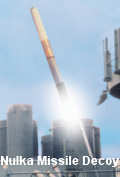 Lockheed Martin agreed in December to a $3 million civil penalty in connection with ITAR violations committed by its subsidiary Sippican. The order imposing the fine was entered on December 12.
Lockheed Martin agreed in December to a $3 million civil penalty in connection with ITAR violations committed by its subsidiary Sippican. The order imposing the fine was entered on December 12.
Sippican was involved in developing the electronic payload for the NULKA missile decoy that was being jointly developed by the U.S. Navy and the Government of Australia. As part of that project, Sippican obtained various TAAs permitting disclosure of technical data related to the NUKLA program to BAE Systems Australia.
According to the charging letter that preceded the consent agreement, Sippican continued to provide technical data after a TAA had expired, provided technical data to parties not authorized under the TAA, and provided technical data explicitly excluded by a proviso to one of the TAAs. In particular, Sippican provided controlled technical data classified at a level higher than Secret even though the TAA in effect at the time only permit transfer of data up to the Secret level.
During discussions with DDTC, Sippican attempted to argue that it transferred the classified data in question because that was required by the Navy contract. DDTC was not amused:
Throughout the investigation, Sippican officials further asserted that the ITAR-controlled technical data transferred, including the technical data classified at a level higher than SECRET, was consistent with their contractual obligations with the U.S. Navy. Sippican also failed to recognize that contractual obligations, even with U.S. Government agencies, do not take precedent [sic] over the Regulations and the Act. . . . After numerous requests for additional information and several meetings with Department personnel, Sippican acknowledged that a contract with a U.S. Government Agency is not a substitute for any export authorizations that might be required.
DDTC is, of course, correct that a government contract does not eliminate the need for an export license.
That being said, it seems that DDTC did not fully understand the background that I surmise led Sippican to make that argument. This would not be the first time that military contracting officers, anxious for the contract to proceed rapidly, pressured contractors to provide deliverables or data without going through the 3-4 month wait (or more) for an export authorization from DDTC. Indeed, in more than one instance with which I’m aware, the contracting officer has represented that no license was necessary precisely because the military was requesting the unlicensed export.
Of course, I only suspect that had happened here because of Sippican’s insistence on pointing to the Navy contract as an excuse; there is no direct evidence that it did happen. But had that been the case, a $3 million dollar fine would certainly be an excessive penalty
 Permalink
Permalink
Copyright © 2007 Clif Burns. All Rights Reserved.
(No republication, syndication or use permitted without my consent.)

 Posted by
Posted by  Category:
Category: 

